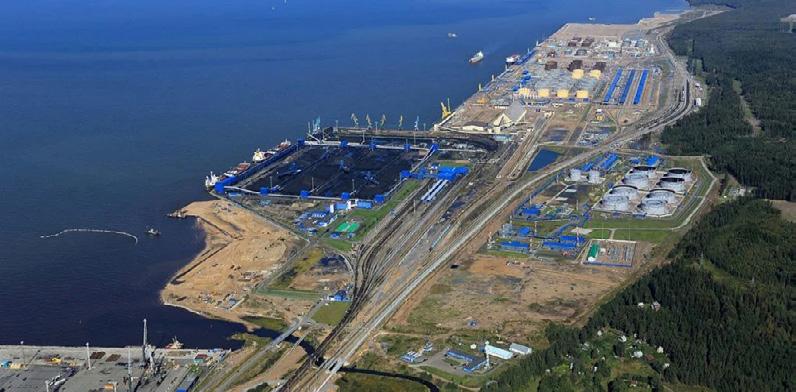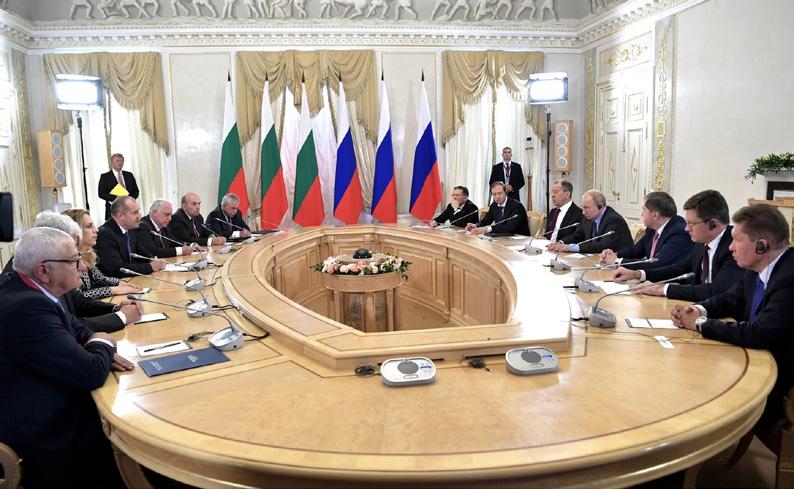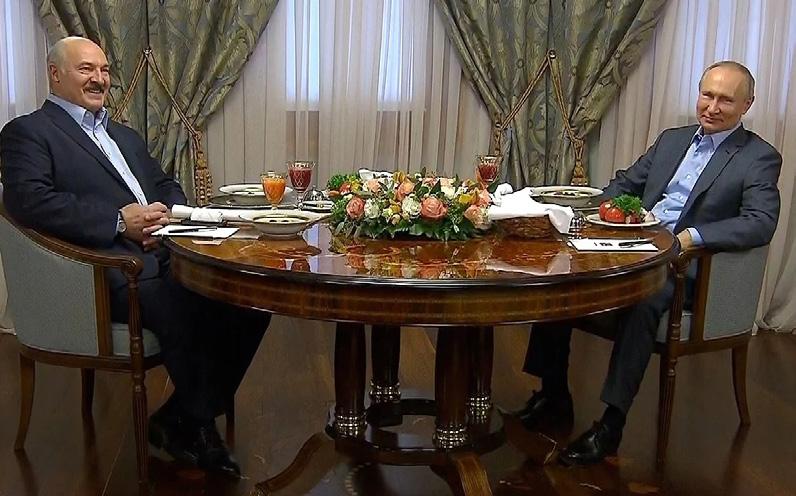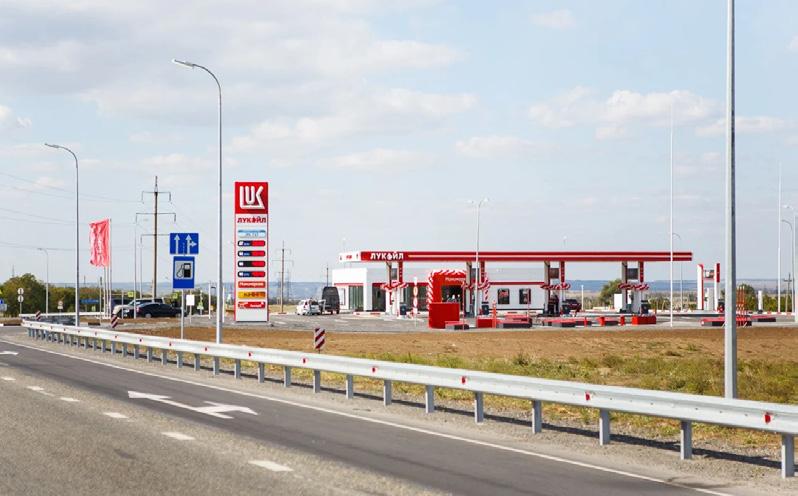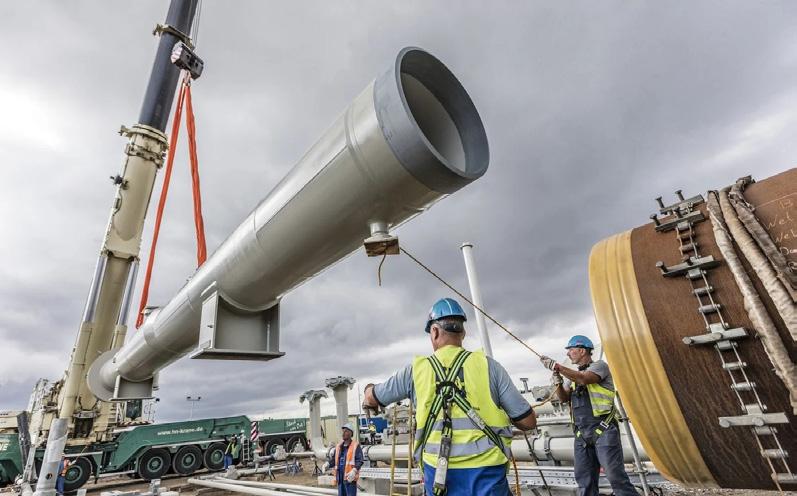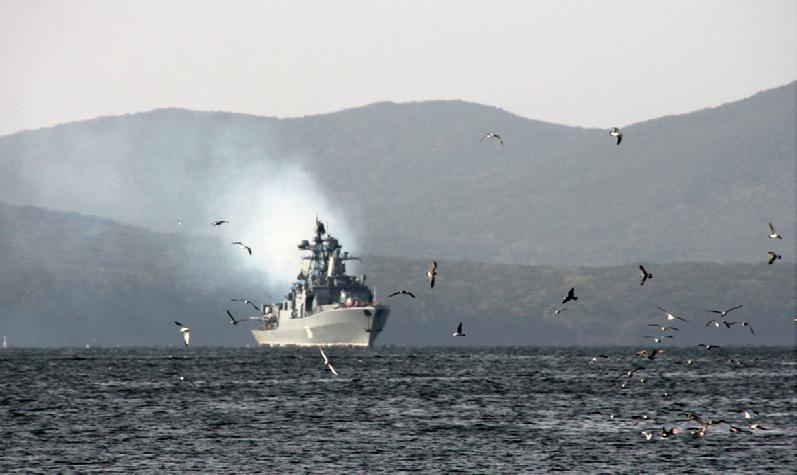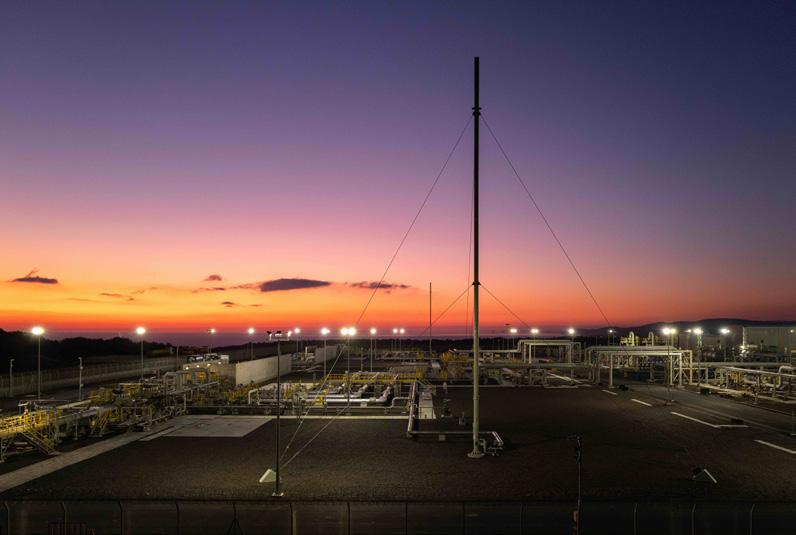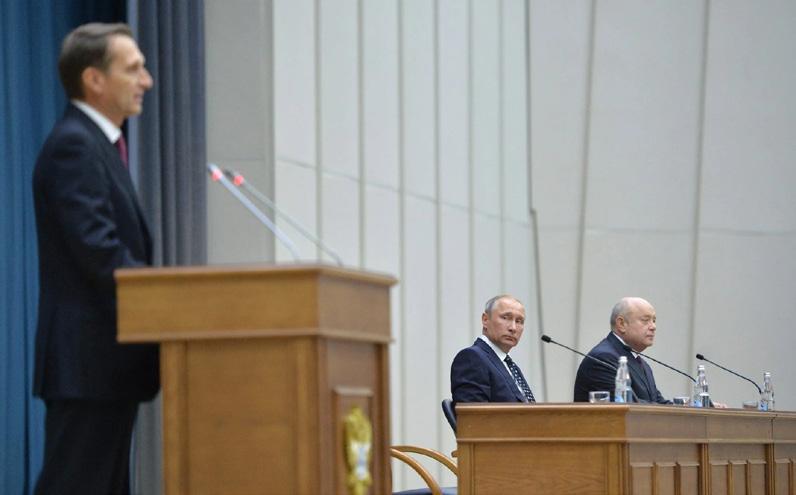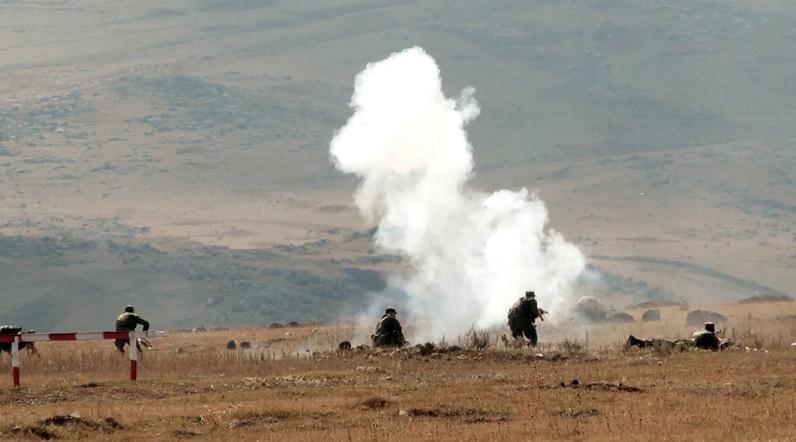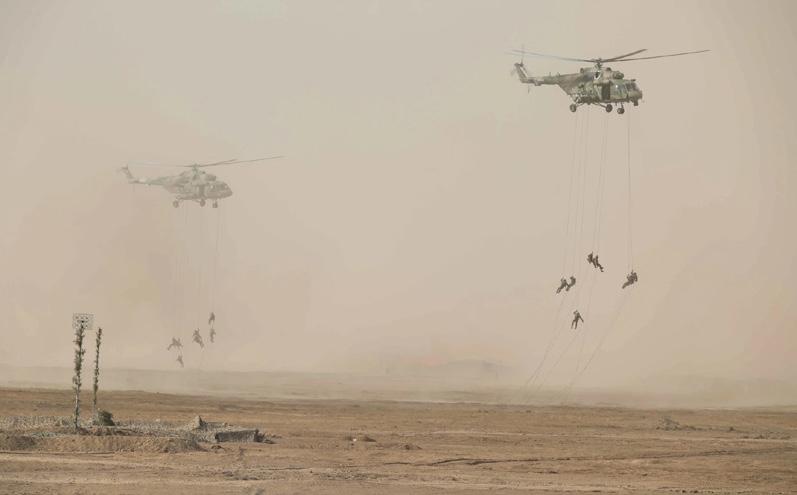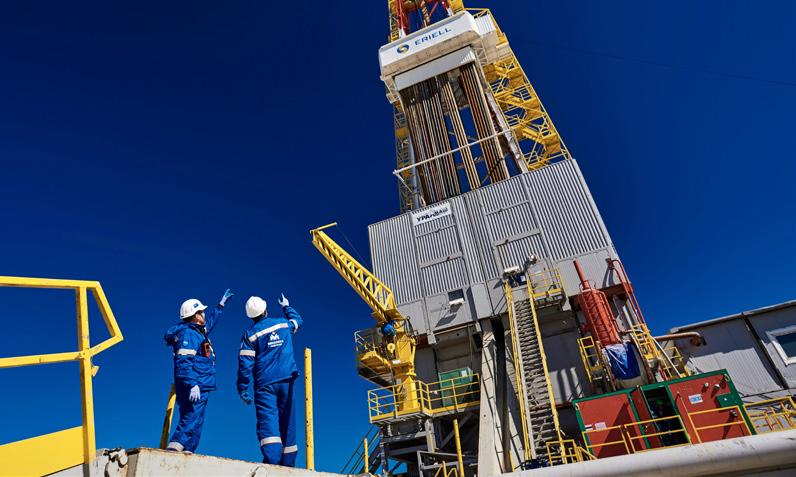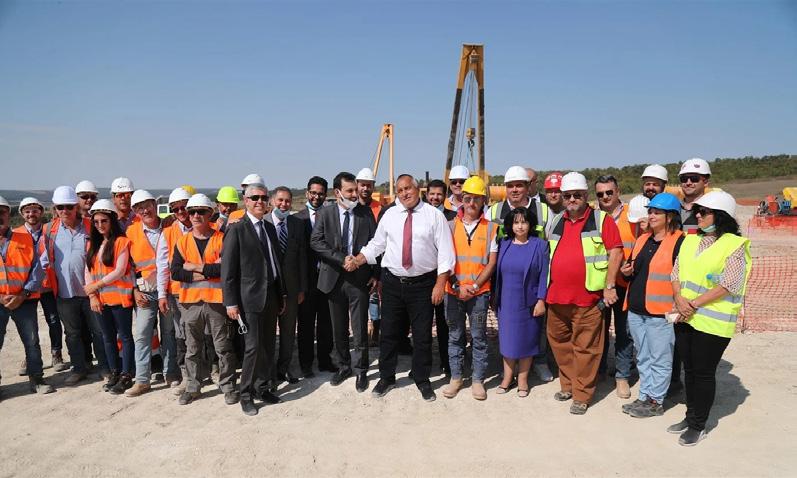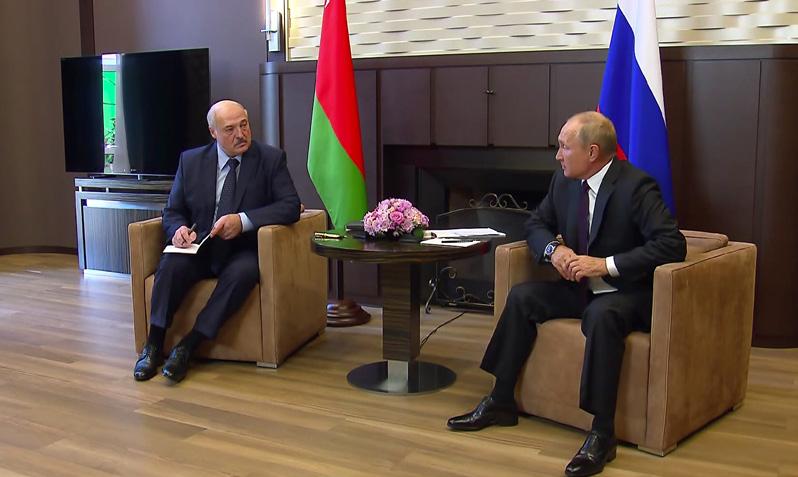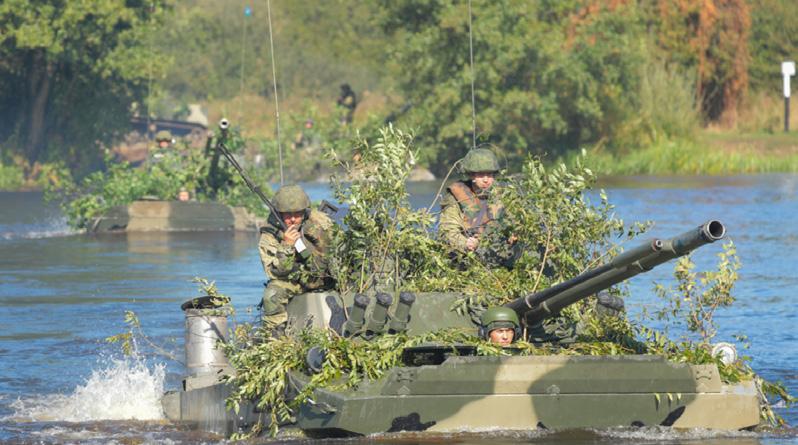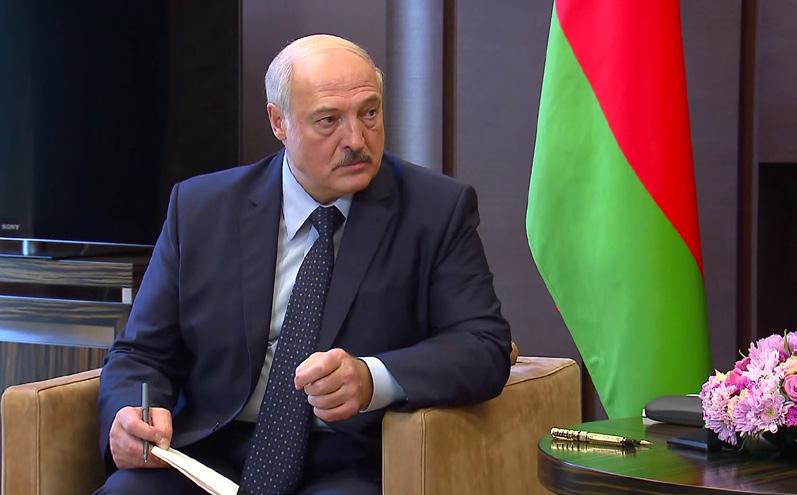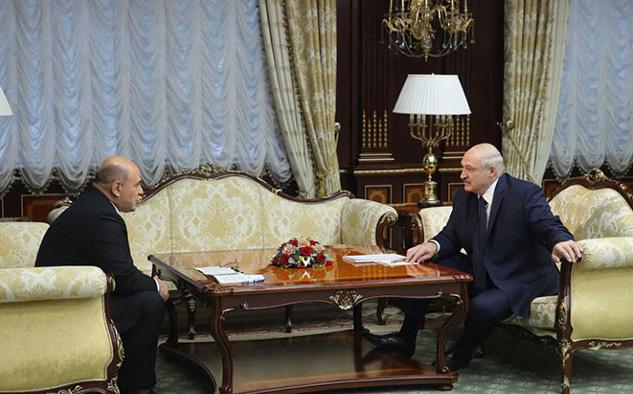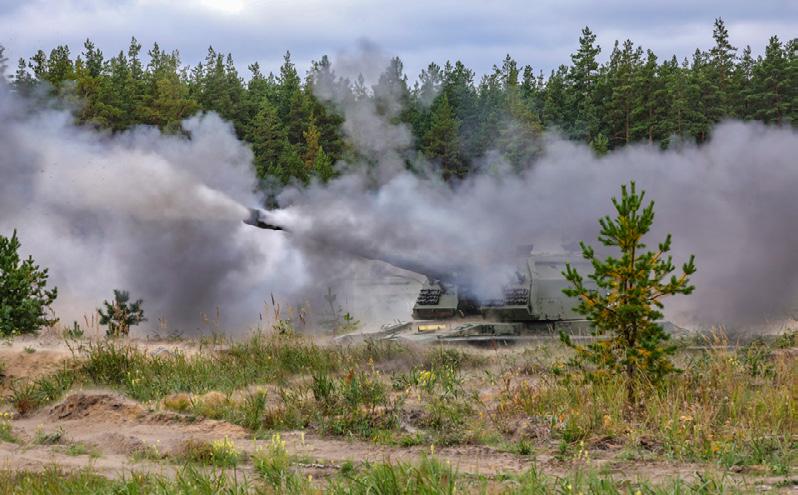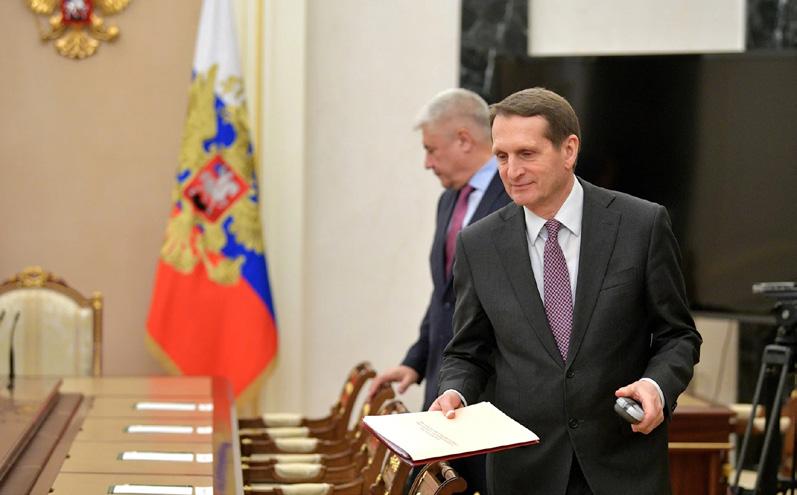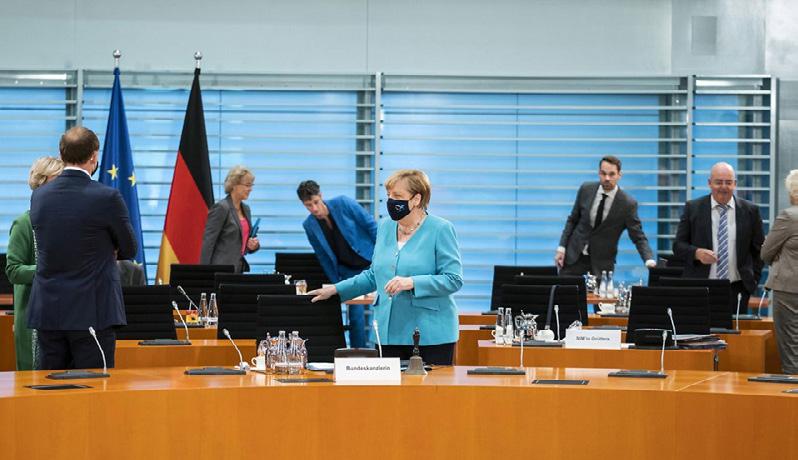MONTHLY September 2020
CONTENTS
6
27
29
NORD STREAM 2
WANT TO ANNEX BELARUS
OUTPUT PROJECTED TO
GERMAN SKIRMISH OVER
WHY PUTIN DOES NOT
RUSSIA’S CRUDE AND FUEL DROP IN COMING YEARS
KAVKAZ-2020: RUSSIA’S BIGGEST MILITARY EXERCISE THIS YEAR
3
NAVALNY AND DISINFORMATION. ACTIVITY OF THE RUSSIAN CHIEF OF INTELLIGENCE
18
4
HOW MUCH WILL LUKASHENKO PAY FOR THE SUPPORT OF RUSSIA?
20 IS A BIG PROBLEM FOR RUSSIA
6
GERMAN SKIRMISH OVER NORD STREAM 2
21
PUTIN AND NARYSHKIN RESORT TO RADICAL ANTI-WESTERN RHETORIC
8
RUSSIA BREAKS DONBAS CEASEFIRE
23
GERMANY PLAYS AGAINST TIME OVER NORD STREAM 2
9
SLAVIC BROTHERHOOD JOINT DRILLS OVERSHADOWED BY A CRISIS
24
RUSSIAN MILITARY DRILLS ON THE KURIL ISLANDS, JAPAN’S NEW PRIME MINISTER
11
LUKASHENKO VISITS SOCHI BUT PAYS NO SPECTACULAR TRIBUTE TO RUSSIA
26
GAZPROM PRODUCES CONSERVATIVE FORECASTS ABOUT TURKEY’S GAS PURCHASES
13
MORE RUSSIAN TROOPS IN BELARUS, DE FACTO PERMANENTLY
27
WHY PUTIN DOES NOT WANT TO ANNEX BELARUS
14
RUSSIAN LIFELINE DOES LITTLE FOR BELARUS
29
RUSSIA’S CRUDE AND FUEL OUTPUT PROJECTED TO DROP IN COMING YEARS
16
RUSSIAN CRUDE OIL SUPPLIES LOSS VALUE
30 BETWEEN BULGARIA AND RUSSIA
17
BULGARIA’S BORISOV REASSURES OVER TURKSTREAM CONSTRUCTION
2
THE WAR IN CAUCASUS
NEW SPYING SCANDAL STRAINS TIES
31
RUSSIA REQUESTS MONEY: WILL BELARUS CUT OFF TRANSIT THROUGH LITHUANIAN PORTS?
www.warsawinstitute.org
SOURCE: KREMLIN.RU
7 September 2020
NAVALNY AND DISINFORMATION. ACTIVITY OF THE RUSSIAN CHIEF OF INTELLIGENCE Russia is waging an information warfare on Alexei Navalny. As the attempt to murder the oppositionist on the plane failed, it turned out that he was poisoned with Novichok agent. As it was foreseeable, the Russian side will now buy time and try to deceive the Germans.
T
he Russian National Medical Chamber has called on German Medical Association to set up a joint expert group to investigate “the main cause of Navalny’s state.”
www.warsawinstitute.org
Characteristically, it announced that “If it turns out that Navalny was really poisoned, it would be necessary to open a criminal case in Russia.” That way, Moscow shows that it takes the case
3
seriously, but expects evidence because the did an excellent job and they could be trusted. representatives of the Prosecutor General’s Naryshkin’s words harmonize with those of Office and the Ministry of Internal Affairs are the Chairman of the State Duma. Vyacheslav of the opinion that there are no reasons to Volodin questioned the assessment of the open a criminal case. Alexander Lukashenko German doctors, saying that Russia has not was supposed to help the Russian narrative. received “any information about Navalny’s It is not known whether he came up with it condition since he crossed the Russian border.” himself or if Moscow suggested it to him, but “If something happens to him now and his during the meeting with the Russian Prime condition deteriorates, we will not be able to Minister he said that his intelligence services rule out that it was a provocation orchestrated intercepted Warsaw’s conversation with Berlin, in the territory of Germany,” Volodin declared. which proves that Navalny’s poisoning is a fraud. The materials provided by Belarus on the case The record of the alleged conversation was of Alexei Navalny “circulate among the special later revealed and is an absolute disgrace to services” and “respectively are analyzed by our the Belarusian regime. The incompetence of special services,” said the Kremlin spokesman this forgery is indeed shocking. And yet, it has Dmitry Pskov on September 4. He accused the served Moscow. “Foreign Intelligence Service is German doctors treating Navalny in a hospital closely following what is happening in Belarus, in Berlin of not being as open as the medics in as well as the plans of the West in relation to Omsk, where Navalny was treated first after this country,” said Sergey Naryshkin – head he lost consciousness. On September 6, Maria of the SVR, on September 2. He assured that Zacharowa – a spokeswoman for the Russian he is in contact with the Belarusian special Ministry of Foreign Affairs, stated that the forces. One day later Naryshkin did not rule out German side was delaying the examination of that Lukashenko’s opinion that the poisoning of the oppositionist’s health. She asked whether Alexei Navalny could be a fake is justified. He this delay was not intentional and allowed the added that he himself allows such an option. possibility that Berlin was playing a “double The head of the SVR argued that the doctors game.” who examined Navalny at the hospital in Omsk
7 September 2020
HOW MUCH WILL LUKASHENKO PAY FOR THE SUPPORT OF RUSSIA? The Belarusian dictator remains in power only thanks to the support of the Kremlin. Of course, Russia will dictate a high price for this. The details, or at least some of them, will probably revealed during Alexander Lukashenko’s visit to Moscow in September. Intensification of contacts between the heads of diplomacy and defense as well as, above all, the appearance of the Russian Prime Minister 4
www.warsawinstitute.org
SOURCE: PRESIDENT.GOV.BY
in Minsk, mean that the details of the new Belarus-Russia agreements are being established. Moscow is likely to promise Lukashenko further economic support, for example in the form of cheap oil and gas, and in return, a rapprochement between the two countries will be announced as a part of the union agreement. This means, de facto, increasing Russian control over Belarus.
R
ussian Prime Minister – Mikhail Mishustin, paid a visit to Minsk on September 3. The parties announced that the Russian Prime Minister’s one-day stay in the capital of Belarus was devoted to economic and energy issues. During the meeting with Alexander Lukashenko, Mishustin noted the progress in strengthening the union agreement between the two countries, which provides for close political, economic and military contacts. “We have deployed actually a half of our Belarusian army. We actually placed under control the western borders with Lithuania and Poland. And, as I frequently say, we have actually encircled Grodno,” said Lukashenko. The antiPolish rhetoric of the President of Belarus were
www.warsawinstitute.org
in line with Moscow’s attitude. A spokeswoman for the Russian Ministry of Foreign Affairs said that the Polish authorities are “at the forefront of the EU’s unfriendly policy towards Belarus.” Maria Zakharova accused Poland of exerting pressure on Belarus and supporting Belarusian opposition forces. As for Prime Minister Mishustin’s visit to Minsk, it is worth noting that he was accompanied by two Deputy Prime Ministers and five Ministers. The visit was of a technical nature – it served to establish the details of new agreements deepening the integration of Belarus and Russia and defining Russian aid for Minsk (for example, gas and oil prices) before Lukashenko’s upcoming visit to Moscow. Most probably these arrangements
5
will be announced then. Recently, Moscow has been visited by the Ministers of Foreign Affairs and Defense of Belarus. The visit of the Belarusian Minister of Foreign Affairs – Vladimir Makei, took place on September 2. After the meeting with him, the Russian Foreign Minister – Sergey Lavrov, condemned the interference of foreign forces in Belarusian affairs. He attacked NATO and the EU for their declarations on Belarus and accused Ukraine of sending about 200 “trained extremists” to Belarus in order to destabilize the country. Makei, in turn, announced that Belarus would impose retaliatory sanctions on people from Lithuania, Latvia and Estonia. The day before, these three countries imposed sanctions on 30 representatives of Belarusian authorities, including President Alexander Lukashenko. On the same day, the Chiefs of the General Staff of Belarus and Russia – Alexander Volfovich and Valery Gerasimov, discussed military cooperation between the two countries and preparations for joint maneuvers. The
conversation took place by phone. The generals discussed, among others, the upcoming Russian Caucasus 2020 strategic command and the joint Belarusian-Russian-Serbian Slavic Brotherhood 2020 wargame, which will take place on the territory of Belarus. After the meeting of the Heads of Diplomacy and later Lukashenko’s with Prime Minister Mishustin, the Belarusian Minister of Defense visited Russia. “The destructive forces in Belarus, encouraged by Poland, Lithuania, the Czech Republic and Ukraine, tried to change power. State authorities opposed this,” announced General Viktar Khrenin on Friday, September 4. The head of the Ministry of Defense spoke at the meeting of ministers of the Commonwealth of Independent States (CIS), Shanghai Cooperation Organization (SCO) and Collective Security Treaty Organization (OUBZ) in Kubinka near Moscow. Minister Khrenin argued that Western countries tried to organize a color revolution in Belarus. However, they failed and are now moving on to a hybrid war.
10 September 2020
GERMAN SKIRMISH OVER NORD STREAM 2 The poisoning of Russian opposition politician Alexei Navalny caused turmoil amongst German senior officials, with all of them waiting for an explanation from Moscow, but just a few being keen to punish Russia. Thus the issue of the Nord Stream 2 energy link came back on the agenda. So far roughly all German politicians stood tenaciously to defend the gas pipeline, notably when the United States announced a batch of sanctions against the energy link. But there is now a group of senior German officials that overtly want Berlin to withdraw from the joint energy project with Russia. Perhaps the poisoning of Russian opposition figure will serve as a comfortable excuse for Berlin to pull the plug on the venture that is now in big trouble due to U.S. policy. Nonetheless, the problem is that by doing so, Germany could risk a major fissure in its ties with Russia. Nobody in Berlin is keen to see that, though. 6
www.warsawinstitute.org
SOURCE: BUNDESREGIERUNG/KUGLER
U
.S. President Donald Trump said on refuse to provide satisfactory answers on the September 7 that the Nord Stream 2 Navalny poisoning. Yet Maas’s threat was rather energy pipeline should not be completed. The specific, with his insisting on severe business U.S. leader yet again slammed Germany for its consequences of not completing the project. joint energy project with Russia. Washington’s “More than 100 companies from 12 European relentless stance and the risk of new sanctions countries are involved in the construction have exerted an influence on the stance of of Nord Stream 2, about half of them from some German politicians. Merkel’s spokesman Germany,” Mass told Germany weekly Bild. His Steffen Seibert said on Monday, September overt declaring that not only Russia will suffer 7, the German chancellor does not rule out from suspending the project also undermines imposing sanctions on the Nord Stream 2 the ultimatum Maas had delivered to Russia. pipeline in response to the suspected poisoning. Saxony state premier and CDU party member Just a few days before, Merkel has asked not Michael Kretschmer went further than that, to tie this matter one with another. Earlier saying that Nord Stream 2 must be completed. several leading Christian Democrats had called “We depend on each other, we need this on Merkel to suspend the construction of the cooperation” he was quoted as saying. Thus Nord Stream 2 gas pipeline, including chairman Christian Democrats seem divided over the of the Bundestag’s foreign affairs committee, whole issue. Kretschmer sees Nord Stream 2 Norbert Roettgen. Germany’s Defense Minister as a purely economic venture and should stay A nneg ret Kramp-Karrenbauer said the away from what he named as “political debates.” question of sanctions on the pipeline relied Those in favor of Nord Stream 2 say that five upon Moscow’s cooperation in clearing up of the six leading energy firms that provide what exactly happened to Navalny. Germany’s some funding to the project are based in EU Foreign Minister Heiko Maas also warned countries, thus everything they do is in line Moscow that his country would abandon the with both national and EU-wide legal solutions. Nord Stream 2 project should the Kremlin www.warsawinstitute.org
7
But Russian officials remain somewhat optimistic. On September 7, Kremlin spokesman told journalists that the Kremlin does not currently see any risks that Germany can block the construction of the Nord Stream 2 gas pipeline. “Currently” is a key word here: Moscow is keeping a close eye on how events unfold in Germany and certainly has done everything to influence Berlin’s final decision. Dmitry Peskov said many believed that proposals to halt the construction of Nord Stream 2 are nothing but “absurd.” Russian Energy Minister Alexander Novak vowed on the same day that the pipeline would be completed despite difficulties amid a drop in gas demand in the aftermath of the coronavirus pandemic. “With a temporary
drop in demand, we cannot state that such infrastructure projects are unnecessary,” Novak said, adding Nord Stream 2 was a long-term project, foreseen for many decades to come. According to what he said, natural gas will remain a top energy source whilst its share in the energy balance might even go up - despite the EU’s renewable energy transition. Earlier Moscow had vowed the Russia-to-Germany gas pipeline could be completed by early 2021. This now seems quite unlikely - as pipe-laying activities beneath the Baltic Sea have not been resumed yet though Russian vessels have already been dispatched to the area whilst Denmark gave go-ahead for building a pipeline segment.
11 September 2020
RUSSIA BREAKS DONBAS CEASEFIRE Back on September 6, the Russian side breached the longest-ever ceasefire regime in the Russian-occupied region of Donbas. Perhaps Moscow is adding fuel to the fire in Ukraine amidst recent turmoil in Belarus and Kyiv’s pledge to freeze ties with Lukashenko’s regime.
P
ro-Russian militants - all of whom fully subordinated to the Russian army - broke the ceasefire regime on September 6 and fired two Ukrainian positions, killing a Ukrainian soldier while injuring two others. Just a day before, Denis Pushilin, the head of what is known as the Donetsk People’s Republic and a Russian man in Donetsk, issued an order to the republic’s servicemen to open fire to destroy Ukraine’s structures along the contact line near the town of Horlivka. Shortly after, Ukrainian President Volodymyr Zelensky held a special meeting. On September 7, Ukraine’s presidential office urged Russia to contain
8
the situation in Donbas and eastern Ukraine as well as provocative feats of pro-Russian fighters. With Moscow being well aware of that, the latter breached the ceasefire regime that had come into effect back on July 27. A trilateral deal had been concluded a few days before by Ukraine, Russia, and the OSCE. The twenty-ninth ceasefire was the longest one, too. Between July 27 and September 2, the OSCE Special Monitoring Mission to Ukraine, or SMM, recorded 900 ceasefire violations, including blasts and firings. A group of mercenaries from 30 countries is now siding with Russia in Ukraine’s east, the country’s Deputy Prosecutor
www.warsawinstitute.org
SOURCE: MINOBORON
General Gyunduz Mamedov informed. Also, Ukraine launched an investigation against over a hundred of them. Those who fight to secure Russia’s interests come notably from Spain, Serbia, Moldova, and France. According
to Mamedov, Russia has set up a number of training facilities across the country to recruit and train mercenaries to be deployed in Donbas and to whom some essential funding and aid were provided.
15 September 2020
SLAVIC BROTHERHOOD JOINT DRILLS OVERSHADOWED BY A CRISIS A joint exercise, codenamed Slavic Brotherhood, takes place annually in Russia, Serbia, and Belarus, consecutively. In 2019, Serbia was the host whilst this year’s edition moved to the Brest region in Belarus. Yet Serbia has dropped out of it for the first time in history. Also, what makes this year’s drills different from
www.warsawinstitute.org
9
SOURCE: STRUCTURE.MIL.RU
the last year’s edition is a new political context. Russian personnel is arriving in Belarus to train altogether with their Belarusian peers as the country is rocked by weeks of mass protests against Lukashenko’s regime - and but for Moscow’s support, it would probably have toppled.
T
he Belarusian-Russian Slavic Brotherhood – Serbia, 2017 – Belarus, 2018 – Russia, 2019 exercise kicked off on September 14 at a – Serbia, 2020 – Belarus). Last year’s edition training ground near the city of Brest in western lasted between June 15 and 26 in Serbia. It Belarus and will last until September 25. It is involved 200 Russian paratroopers, 300 Serbian said to employ 800 people and some 170 units troops, 60 Belarusian servicemen as well as up of military equipment. In the absence of Serbian to 50 combat vehicles. There is no one from troops, it draws 500 troops from Belarus and Serbia, though. The Serbian government has some 100 units of military equipment as well decided to freeze all joint international military as 300 servicemen from Russia along with 70 exercises for the next six months under alleged pieces of military hardware. Moreover, Russia heavy pressure from the European Union. What sent paratroopers from its Pskov division to is remarkable is that Serbia has friendly ties Belarus for the joint drills. War games might with Lukashenko’s regime yet in August, the come as yet another expression of the Kremlin’s country joined EU and the U.S. condemnation support for Lukashenko in the face of a political of the recent presidential elections in Belarus, crisis, but their date - as regular military drills saying these were “neither free nor fair” and - was in fact selected back in October 2019. criticizing the violent crackdown on postThe Slavic Brotherhood has taken place every electoral protests. year for the past five years (2015 – Russia, 2016 10
www.warsawinstitute.org
SOURCE: KREMLIN.RU
16 September 2020
LUKASHENKO VISITS SOCHI BUT PAYS NO SPECTACULAR TRIBUTE TO RUSSIA There was no shortage of opinions that on his first trip to Russia after the presidential vote, Alexander Lukashenko would need to pay a hefty bill for Moscow’s lifeline after Belarus had plunged in a weeks-long crisis. This, however, did not happen. A raft of official conclusions is convenient for Lukashenko whilst not prompting more robust ties between the two countries. Yet the lion’s share of the talks took place behind closed doors. Possibly this is when the two leaders accepted a roadmap on Russia-Belarus ties, along with new projects and decisions.
T
he meeting was Lukashenko’s f irst foreign trip since the August 9 election. The four-hour-plus talks took place at Putin’s residence in Sochi. In opening remarks before
www.warsawinstitute.org
cameras, Vladimir Putin said Moscow would grant a loan worth $1.5 billion to Belarus. According to Kremlin spokesman, a portion of the new loan has been granted to reimburse
11
Minsk’s earlier accounts. As Russian Prime Minister Mikhail Mishustin visited Minsk in early September, some said Russian officials bestowed a $1 billion loan on Belarus. Putin emphasized that the Belarusians themselves must settle the situation without any foreign meddling. Also, Putin had backed Lukashenko’s idea of constitutional reform in what might put an end to the ongoing crisis. The Russian leader confirmed his country’s commitment as a Belarusian ally, vowing to tighten military cooperation. Putin vowed to sustain all allied deals it had with Belarus as part of their joint Union State and the Collective Security Treaty Organization, or CSTO.
aid rather than any military-like assistance. Some Russian experts argue that the Kremlin’s current policy somewhat resembles that in Ukraine back in late 2013 when Moscow threw support for the then Ukrainian leader Viktor Yanukovych. For years Belarus held its economy at some level without any major hiccups notably due to Russian subsidies (cheap hydrocarbons), preferential loans and trade deals, worth $1 billion a year. When Moscow dramatically curbed these, Belarus plunged into a deep crisis. Lukashenko refused to intensify ties in what could impair his power. In a way, both the social unrest and political crisis helped Lukashenko reclaim Russian subsidies. Surely, the Kremlin has no intention of providing a lifeline to Kremlin spokesman Dmitry Peskov said both Lukashenko and Belarus forever. With some leaders did not address Russian military past stories and viewpoints shared by the most bases in Belarus. Likewise, the pair made prominent figures of the Belarusian opposition, no agreements on joint Russian-Belarusian Moscow has long been making efforts to find an businesses in what might give Russian oligarchs alternative to Lukashenko, allowing the Kremlin easy access to Belarus’s most valuable assets. to preserve its influence in the neighboring Oil and gas co-operation was also discussed country and shift its model of dependence in the meeting between the two leaders. The sometime soon. With the latter ambition, a latest events in Belarus, Lukashenko said, show Russian taxpayer would pay less whilst the that Minsk should cooperate closely with whole thing would not wreck Russia’s security Moscow, notably if the economy is at issue. Also, and military interests in Belarus. Just to note he labeled Russia as Belarus’s “elder brother.” here a statement from Kremlin spokesman Contrary to one might think, Lukashenko Dmitry Peskov right after the meeting who will not give in his autonomy so easily. Both said those who both agree and disagree with his words and acts in Sochi that some media the results of the elections are all “citizens of saw as nearly humiliating might be part of brotherly Belarus” whom Moscow values all. Lukashenko’s game whilst his top goal is to keep the grip on power thanks to Moscow’s financial
12
www.warsawinstitute.org
23 September 2020
SOURCE: MIL.RU
MORE RUSSIAN TROOPS IN BELARUS, DE FACTO PERMANENTLY All signs are that security-related issues, including those pertaining to the country’s military, are poised to witness ever-tightening cooperation between Russia and Belarus, prompting a decay in the latter’s sovereignty. Since Alexander Lukashenko is not keen to make concessions on anything referring to politics, economy, and the country’s political system, the military remains the sole option on the table. It is no coincidence that Russian Foreign Minister Sergei Shoigu flew to Minsk roughly two days after Lukashenko’s meeting with Putin in Sochi. Soon after much was said about Russia’s expanding its military presence in Belarus. Though there are no reports on permanent military bases to be installed anytime soon, intensified joint drills and their bigger-than-ever scale is in fact tantamount to Russia’s fixed rotating military presence on Belarusian soil. Officials in Moscow and Minsk announced continuous monthly exercise in what could be the outcome of the Lukashenko-Putin talks in Sochi, and then Shoigu’s trip to Minsk. www.warsawinstitute.org
13
T
he Belarusian Foreign Ministry said on Monday that a group of 1,000 Russian servicemen would be sent to Belarus for Slavic Brotherhood’s second stage (September 22–25). As a whole, the second part is set to attract far more troops than in the first part, as agreed on long before. A group of 6,000 troops was drawn to the military drills, alongside some 500 units of military equipment, with roughly 1,000 servicemen and 100 pieces of hardware dispatched from Russia. Not only were the drills extended in time, but also their whole scale rose dramatically. What both Russia and Belarus was of course that these were just defense drills aimed at “developing a set of actions accordingly to any deals between Russia and Belarus and deepening integration
process to strengthen the Union State and its defense capabilities.” It was believed to employ 800 people and 170 pieces of military hardware, with Belarus preparing some 500 troops and some 100 units of military equipment as well as 300 servicemen from Russia along with 70 pieces of military hardware. Moreover, Russia would have mobilized paratroopers from its Pskov division to Belarus for the joint drills. Also, Moscow deployed a battalion tactical group from the Tula-based 106th Guards Airborne Division to Belarus. The second stage will involve troops from Russia’s Western Operational Command, special forces, air and anti-aircraft defense troops, missile and artillery brigades from Belarus, and airborne detachments from Russia.
24 September 2020
RUSSIAN LIFELINE DOES LITTLE FOR BELARUS Belarus plunged into political and economic turmoil. Thus the Kremlin offered a lifeline to Alexander Lukashenko, with an emergency $1.5 billion loan to help the country avoid a crash in living standards. But this lifeline is not an answer to Minsk’s headache since the new loan will largely go towards refinancing debt already owed to Russia.
B
elarus will channel the lion’s share of its new loan from Russia to cover the outstanding debt to Russian gas giant Gazprom. Russian Finance Minister Anton Siluanov said the $1.5 billion loan - as agreed during a Sochi meeting between Lukashenko and Putin - would come in a few tranches. Russia and the Eurasian Fund for Stabilization and Development will send Belarus the first $1 billion tranche by the end of the year. The remainder will be paid in 2021. Belarus will take about $330 million of its loan from the Eurasian Fund for
14
Stabilization and Development to fully cover its debt to Gazprom, according to Siluanov. This involves Lukashenko’s gas concession towards Moscow. Minsk buys as much as 20 billion cubic meters (bcm) of Russian-sourced gas each year. Officials in both countries are haggling over gas prices. Gas trades at $127 per 1,000 cubic meters whilst Lukashenko had earlier argued this should be no more than $45. Gazprom is keen to discuss gas prices in 2021 yet only after Belarus pays off the debt to Gazprom, the company’s CEO Alexei Miller said back in May.
www.warsawinstitute.org
SOURCE: KREMLIN.RU
Belarus then replied that it had no outstanding debt. But in Sochi Putin must have convinced Lukashenko that there was something to be repaid anyway. The promised Russian lifeline is unlikely to solve Minsk’s financial problems in the long run, with the $1.5 billion being right enough to cover the country’s spending till the end of the year. It is worthwhile adding that as of September 1, Belarus’s central bank had roughly $7.9 billion in reserves whilst its external debt stood at $40 billion, of which $18 billion in the national debt. Long story short,
www.warsawinstitute.org
Lukashenko’s regime has no hard currency. And it will get even worse than that as the IT crisis is aggravating due to political oppression. More and more businesses are moving their premises abroad. Just to recall here that throughout 2019, the Hi-Tech Park, with 886 businesses registered, brought $2 billion in export profits to the country. But for IT exports, Belarus’s budget gap would have grown three times bigger, with $3.2 billion instead of $1.2 billion.
15
24 September 2020
SOURCE: GAZPROM-NEFT.COM
RUSSIAN CRUDE OIL SUPPLIES LOSS VALUE Russia has fewer and fewer crude oil reserves being worth less and less. In terms of value Russian crude oil stocks dropped by 17.1 percent in 2019, the Russian Ministry of Natural Resources said in a statement.
“
The total projected crude oil output volume mineral reserves amounted to 10 trillion roubles, dropped by 43.8 million tons (–0.4 percent) at chiefly due to a drop in the estimate of the cost the end of 2019 year-on-year,” the statement of oil reserves making up 80 percent of the read. The cost of oil reserves in Russia back in total rating of all minerals. Besides, the total 2019 hit 12.7 trillion roubles. As of 2019, the value forecasted production of power coal at the end of domestic crude oil reserves stood at 74.511 of 2019 rose by 132.8 million tons (5 percent) trillion roubles, or $2.2633 trillion. The reason compared to the output in early 2019. In 2019, for the change over the year is that operating the decrease in the cost of power coal reserves expenses increased by 7 percent and capital amounted to 543 billion roubles (-29.4 percent). expenditures grew by 7.2 percent. Also, the The reasons for the decrease in the cost of average oil price decreased by 2.2 percent, inventories are both a slump in the average while the discounted net cash flow went down selling price - and, accordingly, sales proceeds by 4.9 percent. The overall decline in the cost of - as well as an increase in operating costs.
16
www.warsawinstitute.org
25 September 2020
SOURCE: GOVERNMENT.BG
BULGARIA’S BORISOV REASSURES OVER TURKSTREAM CONSTRUCTION There will be no new delays in building the key section of Russia’s TurkStream gas pipeline, Bulgarian officials have informed. Whilst inspecting the construction site of Bulgaria’s string of the gas link, the country’s Prime Minister Boyko Borisov announced that the pipeline would start energy flows by the end of the year in what would pave Moscow’s way for Serbian and Hungarian energy markets.
T
he TurkStream gas link runs from Russia to Turkey along the Black Sea, and further into the Balkans. Its first line transmitting gas commodities to Turkey was opened in January whilst Gazprom plans to send its gas to the Balkans and Central Europe through the second
www.warsawinstitute.org
string. Bulgaria’s 470-kilometer string of the TurkStream pipeline stretches between the country’s borders with Turkey and Serbia. Initial timetables anticipated the project to be completed by late May 2020. A fuss over selecting a contractor caused considerable
17
delays, though. Eventually, Bulgaria awarded a contract to the Saudi-led group Arkad whose representative and Saudi Deputy Minister of Oil Production Abdullah Al-Saadoun accompanied Bor isov dur ing the inspection. W holly controlled by Bulgaria, the project will become operational by the end of the year, Borisov said. All of the pipes needed for the project had already been put, with just one kilometer left to be welded. There are 2,500 people and 1,400 construction machines currently working at the site. Once made operational, it will deliver as much as 8.75 million cubic meters of gas per day, allowing Russian-sourced gas to reach Serbia and Hungary while bypassing Ukraine. Russia
has in the past accused Bulgaria of deliberately delaying the building of the TurkStream natural gas pipeline on its territory. Political frictions between Sofia and Moscow are little helpful, too, with the country’s openly pro-Russian leader Radev fuelling large-scale anti-government protests. The incumbent cabinet, in turn, has emphasized its pursuits to diversify energy flows into the country. In August, Bulgaria and Greece signed a deal on the acquisition of 20 percent interest in a floating liquefied natural gas (LNG) terminal off Greece’s northern coastal city of Alexandroupolis by the Aegean Sea.
28 September 2020
KAVKAZ-2020: RUSSIA’S BIGGEST MILITARY EXERCISE THIS YEAR The active stage of the Russian command-and-staff military drills Kavkaz-2020 wrapped up on September 26 after Russia had hosted what it called its biggest drills this year, with 80,000 servicemen taking part, notably from the Southern Military District. Interestingly, the list of participating post-Soviet and Asian countries as either participants or observers looked impressive.
O
n September 25, Vladimir Putin monitors the main phase of the war games at the Kapustin Yar training ground in the Astrakhan region. The military facility served as the main theater of the combat readiness check. At Kapustin Year forces performed a field test of the TOS-2 thermobaric weapon system, and carried out the first-ever test of an air assault brigade on the BMD-4M amphibious infantry fighting vehicle. The Kavkaz-2020 combat readiness check took place in Russia’s Southern Military District. The drills had two parts, the
18
first of them being focused on formulating and pushing through the planning phase whilst the second being orbital around firing drills to test the command and control, or C2, readiness of joint forces. The Kavkaz-2020 strategic command-and-staff exercises involved ground, air, and naval units in the Caspian and Black Seas. Russian forces were exercising in training grounds across the Southern Military District (Prudboy, Ashuluk, Kapustin Yar, Arzgir, and Kopanskaya), Russian military facilities in Armenia, Abkhazia, and South Ossetia, the last
www.warsawinstitute.org
SOURCE: KREMLIN.RU
two seized from Georgia and annexed by Russia. According to official data, roughly 80,000 people, including 1,000 foreign troops, 250 tanks, up to 450 mechanized infantry fighting vehicles, as well as up to 200 artillery systems and multiple-launch rocket systems (MLRS) were deployed to firing grounds. The drills included officers from the Russian Emergencies Ministry and the Russian National Guard, too. Also, Armenian, Belarusian, Chinese, Pakistani, and Myanmarese forces participated in the exercises while representatives from Azerbaijan, Indonesia, Iran, Kazakhstan, Tajikistan, and Sri Lanka took part as observers. Russia’s combat readiness check is not directed against other countries, the country’s Deputy Defense
www.warsawinstitute.org
Minister Alexander Fomin told foreign defense attachés on the eve of the drills, insisting on their “purely defensive” nature. This might have popped up amidst weeks-long concerns that Moscow could use Kavkaz-2020 to veil its plans to mobilize troops invading Ukraine. Yet the facts contradict what Russian officials declared. Russian forces were in fact exercising a staged armed conflict with another state. Suffice it to say that during the drill, the army trained the skills of repelling terrorists and terrorist groups attacks, protection from the unmanned aerial vehicles and cruise missiles of a mock enemy, and repelling air raids. Besides, troops conducted defense against electronic warfare systems.
19
SOURCE: TWITTER.COM
28 September 2020
THE WAR IN CAUCASUS IS A BIG PROBLEM FOR RUSSIA Moscow is in a tough situation as violence flares up between Azerbaijan and Armenia. Being the latter’s strategic ally, Russia should come to its rescue in what yet could freeze Moscow’s ties with Azerbaijan that have somewhat warmed in recent years. In addition come Turkey’s stance and commitment it has not shown for the past thirty years. This runs the risk of Russia’s stepping into yet another hotbed in the region, after Syria and Libya.
A
zerbaijan launched the massive artillery well as some strategic mountains. Separatists offensive on September 27 in the morning in the Nagorno-Karabakh region said the Azeri over the separatist reg ion of Nagorno- had grabbed a portion of their territory. The Karabakh. Azerbaijani forces carried out an air escalation led to reports of heavy casualties on and artillery attack targeting Armenian civilians both sides, also amongst civilians. Both Armenia and military facilities in Nagorno-Karabakh and and Nagorno-Karabakh declared martial shelled the capital city of Stepanakert. Within law and announced military mobilization. In a dozen hours, Azerbaijan captured some Azerbaijan officials imposed martial law in the civilian settlements in Nagorno-Karabakh as night from September 27 to September 28. The
20
www.warsawinstitute.org
fighting that erupted massively for the first time since an internationally brokered ceasefire agreed in 1994 is bad news for Moscow that for decades has occupied a mediating role in the conflict. A regular war is not in its interest since this would force it to back Armenia. And now Russia has a big problem in Belarus, too. Thus Russian officials will do their utmost to soothe war intentions of both Baku and Yerevan. A few hours after clashes had broken out, Russian President Vladimir Putin called Armenian Prime Minister Nikol Pashinyan. “It is now important to make all possible efforts to prevent further escalation,” Putin
was quoted as saying by the Kremlin’s press service. He also called for halting all military action. Earlier Russian Foreign Minister Sergey Lavrov had discussed the latest situation in a phone talk with Armenian counterpart Zohrab Mnatsakanyan. Russia’s top diplomat held phone calls with Azerbaijani Foreign Minister Jeyhun Bayramov in the afternoon of September 27. He insisted on a peaceful settlement of the Nagorno-Karabakh conflict, adding Russia would continue its mediation efforts as part of the OSCE Minsk Group.
29 September 2020
PUTIN AND NARYSHKIN RESORT TO RADICAL ANTIWESTERN RHETORIC While the Kremlin insists on its backing for Lukashenko and paints Western provocations and pressure, Lukashenko announced a fresh batch of concessions in spheres like economy and integration, once the military is already on the table. Senior Russian officials, notably the head of intelligence services, are delivering somewhat disturbing comments, with Moscow accusing the West of a number of provocations in what might prepare its ground for new and bold moves - this time in Belarus.
S
ergey Naryshkin, director of the Russian Foreign Intelligence Service (SVR), said the United States plans to insert what he named as “extremist elements,” with some activists undergoing training in Poland, Georgia, Ukraine, and the Baltic nations. Alleged provocateurs who were purportedly trained by Western intelligence services and might stage a color revolution are not a new theme in the Kremlin’s rhetoric. There are yet two interesting
www.warsawinstitute.org
elements in Naryshkin’s words: strong anti-U.S. accusations – as he lambasted the Department of State, the CIA, and the Pentagon – and his mentioning of religious matters. The head of Russian intelligence service added that those against Belarusian officials – now in exile – are seeking to invent a plot against the Roman Catholic Church. Sergey Naryshkin also accused the U.S. of interference in the religious situation in Belarus. Any “extreme provocation”
21
SOURCE: KREMLIN.RU
staged against Catholic priests would only Lukashenko delivered a similar speech. He -incite anti-government moods amongst the said his country is ready to launch talks with Catholics in Belarus and involve the Holy See Russia on boosting economic security, which into its turmoil. Still on the same day, Putin – following what the Belarusian ambassador to said that Belarus was facing “unprecedented Russia added about resumed talks on roadmaps external pressure” since the August election. for deeper Belarusian integration within the In televised remarks, the Russian resident union state – might bring further Minsk’s addressed the participants of the Forum of concessions. Russian and Belarusian Regions. Alexander
22
www.warsawinstitute.org
SOURCE: NORD-STREAM2.COM
30 September 2020
GERMANY PLAYS AGAINST TIME OVER NORD STREAM 2 Many signs are that Nord Stream 2 enthusiasts will grow more numerous in Berlin. More and more days have passed since the discovery that Navalny had been poisoned and a heated debated whether to quit the joint Russian energy project or not. No decisions have been made, though. There are fewer critical voices amongst officials whilst those in favor of the project are now gaining momentum. Angela Merkel has gained a lot of time by saying that the decision should be made together with the entire EU, all the more so the EU summit was put off amidst the coronavirus pandemic.
G
ermany’s Nord Stream 2 defenders used this time wisely to strike a counterattack. In an interview with German daily Handelsblatt, Germany’s Economy Minister Peter Altmaier
www.warsawinstitute.org
(CDU) lambasted Nord Stream 2 critics amidst their being inconsistent and backed the gas link. “It is problematic to question projects that have been laid down for many decades every
23
few months,” he told journalists, adding that in that case, private investors would refuse to further participate in such projects. What other arguments did he submit? Altmaier accused Nord Stream 2 critics of not answering as where gas flows would come from into Europe - if not from Russia - if the energy demand rose. Gas flowing via Nord Stream 2 will reach Germany and other EU nations, Altmaier added. For him it looks like an argument in favor of the project in what is particularly fearsome for countries like Poland. They are fearful of Germany becoming a hub for Russian gas commodities, thus flooding neighboring nations with energy flows. Also, the heads of Germany’s eastern regions are lobbying for Nord Stream 2, presenting their common stance on the gas
link at the September 18 conference (Berlin, Brandenburg, Mecklenburg-Vorpommern, Saxony, Saxony-Anhalt, and Thuringia). Manuela Schwesig, Mecklenburg-Western Pomerania’s State Premier, is campaigning most actively to complete the gas link. What might seem is that Germany’s Christian Democrats, notably regional leaders, are most keen to see the Nord Stream 2 pipeline. Among Russia’s German allies are also parties like the AFD and Die Linke. In the whole spat over Nord Stream 2, its proponents focus on the pipeline’s benefits to the German economy. What plays its role here are aggressive lobbying activities, notably from the German Eastern Business Association (Ost-Ausschuss).
30 September 2020
RUSSIAN MILITARY DRILLS ON THE KURIL ISLANDS, JAPAN’S NEW PRIME MINISTER A new Japanese prime minister is unlikely to push Tokyo and Moscow closer to a peace treaty. Before Shinzo Abe sought to normalize relations with Russia in a failed attempt, notably amidst the Kremlin’s tenacity. But Japan’s new prime minister will certainly not be eager to make similar concessions like his predecessor and Russia seems to be aware of this. It is difficult to otherwise explain the kickoff of the Russian military exercise on the disputed Kuril Islands shortly before Putin’s first-ever talk with Yoshihide Suga.
J
apan’s new prime minister told Putin on September 29 that he wanted to settle the two’s dispute over the islands in the Pacific. Both leaders agreed to meet sometime soon. Speaking to reporters after the talks, Suga
24
reportedly said, “I would like to put an end to the issue without leaving it to the next generation.” There are four islands, called the Northern Territories in Japan and the Kurils in Russia. Japan upheld its stance of retrieving four
www.warsawinstitute.org
SOURCE: MIL.RU
islands that had been occupied by the Soviets along with the entire archipelago in the summer of 1945, shortly after Japan’s surrender. This is why Russia and Japan have not yet signed a formal peace agreement. In this case, Putin seems to have listened to military officers who do not want to give the islands back to Japan. It is also vital to see the reaction of some Russians as a peace treaty handing the islands to Tokyo would anger mostly Putin’s voters. Shinzo Abe was the head of the Japanese government since 2012. Back then, he made intensive efforts
www.warsawinstitute.org
to create favorable conditions for signing a peace treaty with Russia. During his tenure, he held twenty-seven meetings with Vladimir Putin. What might yet bar Japan’s new prime minister and Putin from concluding the issue were Russia’s military drills on the disputed islands, launched a few hours between the Putin-Suga talks. Tokyo traditionally decried Russia’s military build-up on the Kuril Islands. This time Russian forces are exercising on two of the disputed islands, involving more than 1,500 personnel and artillery pieces.
25
SOURCE: TURKSTREAM.INFO
30 September 2020
GAZPROM PRODUCES CONSERVATIVE FORECASTS ABOUT TURKEY’S GAS PURCHASES Russian gas imports to Turkey have been in decline, with Azerbaijan pushing boldly to take Gazprom’s place. Meanwhile, Turkey’s long-term gas contract is set to expire soon. In addition comes the war in the Caucasus that might cut off Azeri gas flow into Turkey. Perhaps this is why Moscow believes that Ankara will buy more Russian gas later this year.
26
www.warsawinstitute.org
R
ussia’s gas giant Gazprom showed its average gas price in 2020. It is between $120 and $130 per 1,000 cubic meters, though the Russian energy major sees it close to $130. Also, the company expects its gas supplies to Europe to reach at least 170 billion cubic meters (bcm), thus with no significant changes. The expectations towards the Turkish market exert an impact on Russia’s plans. Gazprom is anticipating an increase in Turkey’s procurement of gas from Russia by the end of 2020. “Turkey’s gas demand arises from factors like the price level and the economic climate,” according to a representative for the Russian energy company. Moscow hopes to see Turkey’s bigger interest in Russian gas commodities since the crude oil index dropped compared with the first six months of 2020. Longer-term deals - like that with Turkey where Gazprom
negotiated how to determine gas prices - are indexed to oil prices. Russia expects to see a rise in Turkey’s gas imports though it assumes this will by no means make up for a decline in exports the country’s companies had struggled with in the first six months of 2020. Between January and June 2020, Gazprom’s gas flows into Europe fell by 18 percent, to 78.9 bcm of gas, compared with 96.4 bcm year-on-year. Russia’s gas deliveries into Turkey dropped by 1.7 times, to 4.7 bcm. Earlier at a videoconference with investors, Andrei Zolotov, the head of the Gazprom Export department, said that the Russian gas giant expected, with cautious optimism, that gas exports to Europe would reach 170 bcm in 2020. Still then, the company said it had seen its European gas price rates ranging from $100 to $160 per 1,000 cubic meters in 2020.
30 September 2020
WHY PUTIN DOES NOT WANT TO ANNEX BELARUS Regardless of what might be either illusionary or real plans of the Russian and Belarusian leaders to unify the two countries, polls found that the idea enjoys limited popularity, notably in Belarus. The Kremlin hopes to avoid the rise in antiRussian moods in Belarus, thus being wary of some themes, though, of course, it backs Lukashenko’s regime.
C
loser integration between Russia and Belarus has fewer supporters in both countries. In Russia, its popularity rate dropped once Belarus had plunged into political turmoil. A poll carried out by a think tank found that 39 percent of Russians said they would back the idea of a union state between the two, yet earlier this year another survey found that 52 percent of Russians were positively inclined toward a union. The number of these being
www.warsawinstitute.org
against has not changed (25 percent against 24 percent), but there are more and more of those having either no option or declaring to refuse to take part in a vote. But in Belarus, there predominates a far more negative stance on the Russian-Belarusian reunification. Before the current political turmoil, a Belarusian poll found that roughly 75 percent of Belarusians were against a union and believed that the two countries should be completely independent
27
SOURCE: KREMLIN.RU
but maintain good relations with an open border. The survey also showed that some 13 percent backed the idea of a union state including the two, but only 4 percent favored Belarus being incorporated into the Russian Federation. Not surprisingly, Putin excludes the idea of annexing Belarus. This now would not be worth it for the top three reasons. First, the union state is a severe burden for the Russian budget as the Belarusian economy required
28
profound reforms and long-lasting support. Secondly, “reunification” efforts might bolster anti-Russian moods, quite marginal amongst the Belarusian nations, and imbue protests being in fact geopolitically pro-Russian - with a clearly pro-Western stance. Thirdly, any attempts to annex Belarus into Russia would spark outrage in the West while aggravating Moscow’s spat with NATO, the EU, and the U.S.
www.warsawinstitute.org
SOURCE: LUKOIL.COM
30 September 2020
RUSSIA’S CRUDE AND FUEL OUTPUT PROJECTED TO DROP IN COMING YEARS Production of oil and gas condensate in Russia is projected at 507.4 million tons in 2020, a 9.5 percent decrease compared with 2019, according to the country’s report on social and economic development for 2021 and the planned period of 2022 and 2023 presented by the Economic Development Ministry.
I
n 2019, Russia’s oil production stayed at a record level of 560.8 million tons. However, the country’s production will remain under the OPEC+ limitations through 2023. Its recovery to the previous level of 560 mln tons is probable in 2023. Besides, in 2020, oil export will decrease to 225 million tons, or by 16.4 percent yearon-year. In 2023, oil export is expected to rise
www.warsawinstitute.org
to 266.2 mln tons. In its report, the Economic Development Ministry expects that Russia’s oil export to “far abroad” countries will increase to 242.2 million tons by 2023 mainly due to the growth of supplies to Asian and Pacific nations. Between 2021 and 2023 export to CIS countries will remain at 24 million tons. In 2019, Russia’s explored reserves totaled 6.2 percent of the 29
total global reserves, which makes it the world’s sixth-biggest country in this respect. In 2020, Russian economy officials expect a 3.2 percent drop in the crude processing figures amid a collapse in fuel demand in the aftermath of the coronavirus pandemic. The massive economic slowdown will contribute to the drop in automotive fuel output, to 40.1 million tons. In 2021 it is forecast to climb by 5 percent,
to 42 million tons. Meanwhile, the production of diesel is projected to grow by 2.8 percent in 2020, to 80.6 million tons. In 2023, crude oil processing figures are foreseen to hit 286 million tons. There will be other increases, too. By 2023, automotive fuel output is projected to grow by 5.1 percent compared with 2019 (42.3 million tons) while diesel production might rise by 6 percent, to 83.1 million tons.
30 September 2020
NEW SPYING SCANDAL STRAINS TIES BETWEEN BULGARIA AND RUSSIA Bulgarian officials ordered to expel two Russian diplomats over spying allegations. This is as yet another spying scandal between Bulgaria and Russia this year. The two expelled Russians served for the military intelligence agency SOURCE: KREMLIN.RU
www.warsawinstitute.org
30
B
ulgaria’s public prosecutor’s off ice admitted having collected enough data to accuse Russian diplomats of espionage. Both were asked to leave the country. Both President Rumen Radev and Prime Minister Boyko Borisov approved the foreign office’s decision. The investigation was initiated at the request lodged by Bulgaria’s counterintelligence service (DANS). The State Agency for National Security said the two Russian nationals had supposedly collected data on plans to upgrade the Bulgarian army and maintain the technical readiness of military hardware. Alleged diplomats, who were in fact military intelligence officers, contacted Bulgarian nationals having access to data on the country’s arms industry. In some cases, a group of Bulgarians collected information, including official and state secrets, and handed it to the Russians in exchange for money. The two had been engaged in alleged spying activities in Bulgaria since 2016. When
the investigation found these were Russian diplomats, it was brought to a halt while the prosecutor’s office passed relevant data to the foreign ministry. Bulgaria’s chief prosecutor Ivan Geshev informed the country’s Deputy Prime Minister and Foreign Minister Ekaterina Zakhareva. Meanwhile, the Bulgarian foreign ministry took steps to expel diplomats whose activities deemed incompatible with their status. The Russian Embassy deplored the move and castigated the expulsion as baseless, with the decision made on “bogus” data. Russia’s foreign office vowed to advance titfor-tat measures, thus it will expel two Bulgaria diplomats who had a comparable rank to the two Russians. This is another spying scandal between Sofia and Moscow. In January 2020, two Russian diplomats were ordered to leave for similar reasons. Earlier Bulgaria had declined a visa to the incoming defense attaché at the Russian embassy in Sofia.
30 September 2020
RUSSIA REQUESTS MONEY: WILL BELARUS CUT OFF TRANSIT THROUGH LITHUANIAN PORTS? Alexander Lukashenko has said he would block Baltic countries from shipping goods to Russia over Belarusian territory, and divert what is now sent through notably ports in Lithuania to the seaports in Russia. Belarus will have to pay much more, also according to what Russia is saying. If it is true, Lukashenko will start paying off his debt of gratitude to Russia amidst Moscow’s support during the Belarus political crisis.
www.warsawinstitute.org
31
SOURCE: KREMLIN.RU
A
lex ander Lukashenko said in early September that he would close borders with the Baltic nations and divert exports to the Russian ports in the Baltic Sea. Now it is Russia’s turn. Russian Energy Minister Alexander Novak said that Belarus has a potential for supplying around 4-6 million tons of oil products per year via ports in Russia. Earlier in September he argued this would be between 3 and 4 million tons. The issue is now being discussed, with new arrangements coming soon, but Belarus is allowed to use capacities in the seaports of St. Petersburg, Ust-Luga, and Primorsk, Novak told in an interview for Rossiya 24 TV channel. In September Russia would draft proposals on the delivery of Belarusian oil products via the Russian ports. Novak also suggested beginning
www.warsawinstitute.org
what he named as the “dialogue” on common energy markets in areas like crude oil, gas, and electricity. Being in energy cooperation with Russia is of strategic importance for Belarus. Minsk has always sought to receive cheap Russian hydrocarbons. Belarus long bought crude oil at Russian domestic prices to process it in its Novopolotsk and Mozyr refineries and sold oil products to the West via the Baltic seaports. As it seems, the price Belarus would have to pay for cheap hydrocarbons will be to redirect exports to the Russian exports in a move that reduces the country’s profitability of both crude processing and fuel exports.
32
www.warsawinstitute.org
33
General information The Warsaw Institute is the first conservative geopolitical think tank in Poland. The main areas of our interest are: geopolitics, international relations, energy security, defence, history, culture and any other issues crucial for Poland and East-Central Europe. We are proudly supporting the 3 Seas Initiative and transatlantic relations. The Warsaw Institute develops and provides innovative and practical recommendations based on the wide experience of its experts (over 40 cooperating experts). The Warsaw Institute helps to improve public policy and decision-making through research and analysis. Our activities are dedicated to government organizations and agencies as well as non-governmental organizations, think tanks, research institutes, academic communities, opinion-forming media and experts. The Warsaw Institute is an independent, non-profit, nonpartisan organization supported by contributions from individuals.
Goals and objectives •
• • • •
strengthening the position of the Polish state by preparing and providing its partners with analyses and studies concerning economic policy, international relations, security policy, the use of soft power and more international cooperation of states, societies and NGOs supporting the development of democracy, economy and entrepreneurship energy security and military security cultivating and promoting Poland’s national and state traditions and developing national, civic and cultural awareness
The Warsaw Institute Review Free Polish quarterly, prepared essentially for English-speaking readers around the world. Main goal is to present a broad spectrum of topics concerning Poland, a leading East-Central European country, in the form of analytical articles on political, legal, economic, social, historical and institutional issues.
Subscribe to the printed edition of The Warsaw Institute Review on our website.
Programs Romania Monitor - the first platform that would
bring together think tanks and analysts from both countries, interested in geopolitics, energy security and military cooperation between Poland and Romania.
Disinformation Program - this program involve
carrying out professional analyses on the identification and creation of methods for combating organised disinformation and training against disinformation threats.
Ukraine Monitor - Warsaw Institute experts
monitor and analyse information on Ukrainian politics and business with the view to anticipating the main medium- and long-term changes that can occur in a country playing a key role for many stakeholders.
Baltic Rim Monitor - this program offers the
analysis of the newest events concerning Baltic basin countries.
Review of the most important events relating to Russian security. Warsaw Institute experts monitor and analyze activities of the Kremlin and its subordinate services to anticipate their short-term and longterm consequences, particularly for neighboring countries and the Western world.
download mobile application
Š COPYRIGHT 2020 The Warsaw Institute Foundation The opinions given and the positions held in materials in the Russia Monitor solely reflect the views of authors.
The Warsaw Institute Foundation Wilcza 9 St., 00-538 Warsaw, Poland +48 22 417 63 15 office@warsawinstitute.org

